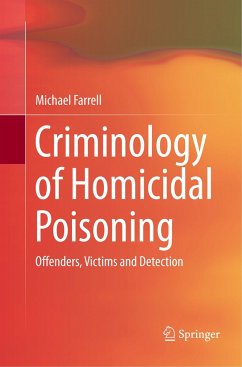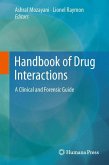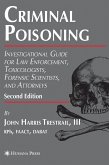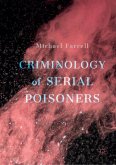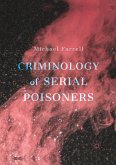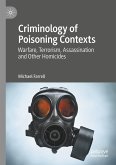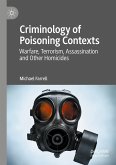This book provides an overview of historical and contemporary cases of homicidal poisoning. While homicidal poisoning is sometimes thought of as a thing of the past, it continues to be a contemporary problem, and in fact the unknown offender rate for poisoning cases is 20-30 times that of other homicide types in contemporary research, and many poisoners commit serial homicides while going undetected.
The author of this important and timely work explores the theoretical bases for understanding homicidal poisoning, the nature of poisons used in homicidal cases, the characteristics of poisoners and their victims, and techniques for detection and prevention.
This unique book will be of particular interest to: students of criminology (classes dealing with criminal psychology, and murder investigation); students of the history of crime; criminal justice professionals: attorneys, homicide detectives, forensic pathologists, forensic and clinical toxicologists, and other forensic investigators; and all interested in poisons, poisoners and the detection of poisoning. It has relevance to criminology, law and policing, toxicology and forensic science, the history of crime and detection, and criminal psychology.
Endorsements:
"A most welcomed addition to the important subject of the criminal poisoner. The author has done a fantastic job of researching the world literature, and distilling it down for the reader. The work is very well referenced, and provides critical information for law enforcement, forensic pathologists, and others, that could be dealing with the criminal poisoner."
John H. Trestrail IIIToxicologistLos Lunas, New Mexico USA
"Dr Michael Farrell has produced a comprehensive and authoritative work on a most serious but often overlooked aspectof criminal assault - the act of poisoning. In the Criminology of Homicidal Poisoning, Farrell seamlessly weaves together the facts about poisons and their use as an instrument of homicidewith the context of the larger issue of murder. By examining the poisoner and the victim, the reader is provided a depth of understanding about how a deadly outcome arose and why the choice was made to employ poison to get the grisly job done. With criminal homicide by poisoning making up a small percentage of known crimes, the danger of insufficient scholarly attention is present. Dr Michael Farrell makes a significant contribution to ensure against this potential. As a homicide researcher, I know Criminology of Homicidal Poisoning will join the works I turn to in understanding the nuances of the how and why of homicide."
Dr Richard M. Hough, Sr., Criminology and Criminal Justice and Public Administration Program Coordinator, University of WestFlorida, US
"This comprehensive text links forensic toxicology with criminology, making a solid contribution to both fields. Farrell not only describes how homicidal poisoning fits the most popular criminological theories for whypeople kill but also examines the nature and lethality of various poisons, identifies trends in poisoning, provides a history, and shows offender traits and victim characteristics. In addition, he discusses issues for investigators and prosecutors who will be taking a poisoning case to trial."
Katherine Ramsland Professor of forensic psychology at DeSales University, PennsylvaniaPsychology Today
The author of this important and timely work explores the theoretical bases for understanding homicidal poisoning, the nature of poisons used in homicidal cases, the characteristics of poisoners and their victims, and techniques for detection and prevention.
This unique book will be of particular interest to: students of criminology (classes dealing with criminal psychology, and murder investigation); students of the history of crime; criminal justice professionals: attorneys, homicide detectives, forensic pathologists, forensic and clinical toxicologists, and other forensic investigators; and all interested in poisons, poisoners and the detection of poisoning. It has relevance to criminology, law and policing, toxicology and forensic science, the history of crime and detection, and criminal psychology.
Endorsements:
"A most welcomed addition to the important subject of the criminal poisoner. The author has done a fantastic job of researching the world literature, and distilling it down for the reader. The work is very well referenced, and provides critical information for law enforcement, forensic pathologists, and others, that could be dealing with the criminal poisoner."
John H. Trestrail IIIToxicologistLos Lunas, New Mexico USA
"Dr Michael Farrell has produced a comprehensive and authoritative work on a most serious but often overlooked aspectof criminal assault - the act of poisoning. In the Criminology of Homicidal Poisoning, Farrell seamlessly weaves together the facts about poisons and their use as an instrument of homicidewith the context of the larger issue of murder. By examining the poisoner and the victim, the reader is provided a depth of understanding about how a deadly outcome arose and why the choice was made to employ poison to get the grisly job done. With criminal homicide by poisoning making up a small percentage of known crimes, the danger of insufficient scholarly attention is present. Dr Michael Farrell makes a significant contribution to ensure against this potential. As a homicide researcher, I know Criminology of Homicidal Poisoning will join the works I turn to in understanding the nuances of the how and why of homicide."
Dr Richard M. Hough, Sr., Criminology and Criminal Justice and Public Administration Program Coordinator, University of WestFlorida, US
"This comprehensive text links forensic toxicology with criminology, making a solid contribution to both fields. Farrell not only describes how homicidal poisoning fits the most popular criminological theories for whypeople kill but also examines the nature and lethality of various poisons, identifies trends in poisoning, provides a history, and shows offender traits and victim characteristics. In addition, he discusses issues for investigators and prosecutors who will be taking a poisoning case to trial."
Katherine Ramsland Professor of forensic psychology at DeSales University, PennsylvaniaPsychology Today

